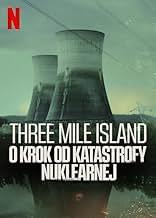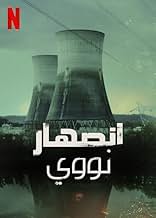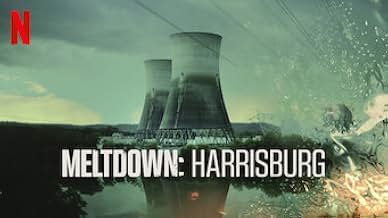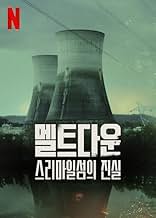CALIFICACIÓN DE IMDb
6.8/10
5.8 k
TU CALIFICACIÓN
Información privilegiada sobre los acontecimientos, las controversias y los efectos persistentes del accidente de la central nuclear de Three Mile Island, en Pensilvania.Información privilegiada sobre los acontecimientos, las controversias y los efectos persistentes del accidente de la central nuclear de Three Mile Island, en Pensilvania.Información privilegiada sobre los acontecimientos, las controversias y los efectos persistentes del accidente de la central nuclear de Three Mile Island, en Pensilvania.
- Premios
- 5 nominaciones en total
Explorar episodios
Opiniones destacadas
I'm not sure why so many nuclear power fans are upset by this docuseries. It does lean on the dramatic, but the message of pro-nuclear power is repeated over and over by one of the main interviewees. The concern is not the technology, but the rich men we entrust to run nuclear plants safely. All this docuseries want is responsibility in the operation of public utilities, and I can't see why anyone would find that bad. It's a compelling view into the, pardon the pun, fallout of the accident, and worth the time for people interested.
The main individual that this documentary centers around is Richard ("Rick") Parks. He was a nuclear engineer hired as part of the clean-up operation at Three Mile Island. As he unequivocally says at the beginning and end of the series, he's a believer in nuclear energy. He is a proponent.
What he's not a believer in, after his experience, is putting nuclear safety in the hands of private enterprise. The pressures to be profitable (or avoid losses) can force lapses in safety ... and that should never be on the table.
As far as a documentary is concerned, it's "ok". It lags a lot in the middle and didn't have much in the way of counterpoint experts. However, because it compiled and presented a lot of interesting information about the incident that I knew little about ... I have to give it credit. The idea that there was a second potential disaster involved (the polar crane operation) - was truly eye-opening.
As far as the downsides - there wasn't a lot of counterpoint from nuclear experts. This is understandable. From friends I have in the industry, they tell me the nuclear industry is a small community. If your name gets associated with anything anti-industry, the professional hit could be a career ender. Still, it would have been nice to see more scientific experts presented ... esp. If they had counterpoint ideas.
A fun fact they showed was that Pres. Jimmy Carter was a nuclear engineer and was once involved in repairing a damaged reactor himself. He showed up at Three Mile Island to calm tensions and support the industry.
Near the beginning I wondered if this would have been more interesting as a dramatization, like the Chernobyl mini-series. However, after a while, I understood why this may have been better as a documentary. The story they tell is more of disasters being averted ... which is great, but different than the stories of Chernobyl, Titanic, etc.
All in all - it's an interesting watch. The world is a bit different today than in 1979; there's a focus on solar, wind and even the sea for new sources of power. If they don't pan out soon, interest may eventually refocus on nuclear energy.
If you want nuclear accident suspense, watch "The China syndrome" and "Chernobyl". If you want whistleblower drama, watch "Silkwood" ... and (though it's a documentary) this series.
What he's not a believer in, after his experience, is putting nuclear safety in the hands of private enterprise. The pressures to be profitable (or avoid losses) can force lapses in safety ... and that should never be on the table.
As far as a documentary is concerned, it's "ok". It lags a lot in the middle and didn't have much in the way of counterpoint experts. However, because it compiled and presented a lot of interesting information about the incident that I knew little about ... I have to give it credit. The idea that there was a second potential disaster involved (the polar crane operation) - was truly eye-opening.
As far as the downsides - there wasn't a lot of counterpoint from nuclear experts. This is understandable. From friends I have in the industry, they tell me the nuclear industry is a small community. If your name gets associated with anything anti-industry, the professional hit could be a career ender. Still, it would have been nice to see more scientific experts presented ... esp. If they had counterpoint ideas.
A fun fact they showed was that Pres. Jimmy Carter was a nuclear engineer and was once involved in repairing a damaged reactor himself. He showed up at Three Mile Island to calm tensions and support the industry.
Near the beginning I wondered if this would have been more interesting as a dramatization, like the Chernobyl mini-series. However, after a while, I understood why this may have been better as a documentary. The story they tell is more of disasters being averted ... which is great, but different than the stories of Chernobyl, Titanic, etc.
All in all - it's an interesting watch. The world is a bit different today than in 1979; there's a focus on solar, wind and even the sea for new sources of power. If they don't pan out soon, interest may eventually refocus on nuclear energy.
If you want nuclear accident suspense, watch "The China syndrome" and "Chernobyl". If you want whistleblower drama, watch "Silkwood" ... and (though it's a documentary) this series.
I'm sure they were all virologists this morning and climate scientists in the afternoon.
I was eight years old when TMI happened. We lived in Mechanicsburg, PA, 18 miles away - - can remember getting picked up from school out of the blue by my parents and riding to my aunt and uncle's in Allentown. Part of the documentary is about that unknown and just how worrisome it was for those who lived in South Central PA.
For those who say there weren't any "experts" heard from in the documentary, I'm not sure what they were watching. It's pot calling kettle black for everyone who is claiming bias with the film - - multiple experts are interviewed, but obviously not ones such reviewers want to hear from. It does spend most of the time in the later episodes with the whistleblower. It has a point of view. Other than that, the complaints are what is overblown, not the story of TMI as rendered here.
I was eight years old when TMI happened. We lived in Mechanicsburg, PA, 18 miles away - - can remember getting picked up from school out of the blue by my parents and riding to my aunt and uncle's in Allentown. Part of the documentary is about that unknown and just how worrisome it was for those who lived in South Central PA.
For those who say there weren't any "experts" heard from in the documentary, I'm not sure what they were watching. It's pot calling kettle black for everyone who is claiming bias with the film - - multiple experts are interviewed, but obviously not ones such reviewers want to hear from. It does spend most of the time in the later episodes with the whistleblower. It has a point of view. Other than that, the complaints are what is overblown, not the story of TMI as rendered here.
{NOTE: the 1-star review "Do not watch for accurate facts" is relevant (but also incomplete) IMHO}
This documentary is excellent ... by Netflix standards. An example of a terrible documentary is the one they did on MH370, which was overly-long and spent copious time on inane conspiracy theories.
Meltdown: TMI goes a great job showing the cover-up attempts and related corruption, as well as the toll on the residents. It does NOT do a good job explaining the details of the initial accident and the misguided response. You have to have a VERY good reason to turn off cooling pumps and/or High-Pressure Injectors (HPI) when a reactor's temperature is getting out of control, and this was poorly explained. To be fair, some details of this accident were NEVER properly explained (see Wikipedia), but still -- Netflix could have done a better job, instead of showing the same distraught locals over and over and over again.
There are some unanswered questions. The NRC still claims very little radiation was released, despite the dead fish observed and a least one person with radiation "burns" (lesions) over much of her body. What happened to this person? Why wasn't she Exhibit A in (eventually) refuting the platitudes the NRC and GPU (the plant owner) told the public?
This documentary had the potential for ten stars. However, given the flaws, I'm giving it eight (8) stars. Mind you, it's still gripping and effective; I'm still angry the next day. FYI, I'm an engineer and have some actual knowledge of the cooling systems and related thermodynamics. I even tested my knowledge on a NPP failure simulator.
This documentary is excellent ... by Netflix standards. An example of a terrible documentary is the one they did on MH370, which was overly-long and spent copious time on inane conspiracy theories.
Meltdown: TMI goes a great job showing the cover-up attempts and related corruption, as well as the toll on the residents. It does NOT do a good job explaining the details of the initial accident and the misguided response. You have to have a VERY good reason to turn off cooling pumps and/or High-Pressure Injectors (HPI) when a reactor's temperature is getting out of control, and this was poorly explained. To be fair, some details of this accident were NEVER properly explained (see Wikipedia), but still -- Netflix could have done a better job, instead of showing the same distraught locals over and over and over again.
There are some unanswered questions. The NRC still claims very little radiation was released, despite the dead fish observed and a least one person with radiation "burns" (lesions) over much of her body. What happened to this person? Why wasn't she Exhibit A in (eventually) refuting the platitudes the NRC and GPU (the plant owner) told the public?
This documentary had the potential for ten stars. However, given the flaws, I'm giving it eight (8) stars. Mind you, it's still gripping and effective; I'm still angry the next day. FYI, I'm an engineer and have some actual knowledge of the cooling systems and related thermodynamics. I even tested my knowledge on a NPP failure simulator.
Whoever produced this documentary clearly doesn't like nuclear power. Nearly every single interview & pundit gives an anti-nuclear biased account. The primary pundit (and only employee of TMI) is a disgruntled former employee who fell in love with an anti-nuclear campaigner in the middle of this thing, and greatly over-dramatises his account. A lot of focus is also put on near-clueless residents of the nearby town, who are quite irritating with their over-acted "minute of fame" accounts, and blame every rash on their butt on the incident. They certainly deserve to be heard, but shouldn't be used as replacements for educated voices. And there are barely any educated voices in this documentary. No international opinions, no voices from the current nuclear industry, no industrial safety experts, zero defence or applause of the actions taken by highly skilled people which probably saved many lives, zero mention of the fact the design of the facility worked exactly as it should and prevented a release, and no mention of the vastly improved safety record of the industry. The whole thing is accompanied by cheesy dramatic music to build tension and doom. It's a step down from Netflix's usual standard for documentaries - like something from 15 years ago - and certainly doesn't touch Chernobyl for viewing intrigue. In fact, Chernobyl probably does a better job documenting the incident, and it's not even a documentary.
¿Sabías que…?
Selecciones populares
Inicia sesión para calificar y agrega a la lista de videos para obtener recomendaciones personalizadas
- How many seasons does Meltdown: Three Mile Island have?Con tecnología de Alexa
Detalles
- Fecha de lanzamiento
- País de origen
- Sitio oficial
- Idioma
- También se conoce como
- أختان برباط الدمّ
- Productoras
- Ver más créditos de la compañía en IMDbPro
Contribuir a esta página
Sugiere una edición o agrega el contenido que falta

Principales brechas de datos
What is the Spanish language plot outline for Meltdown: Three Mile Island (2022)?
Responda






































